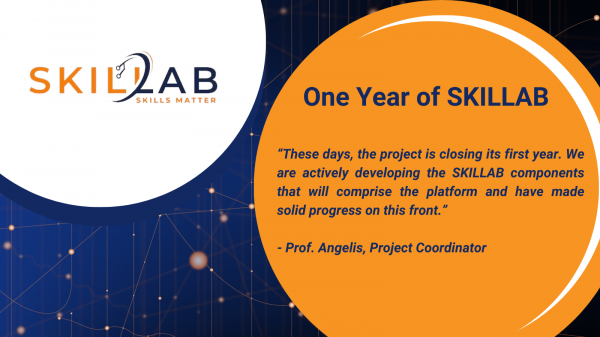In this interview we look back at one year of SKILLAB with our coordinator Prof. Angelis from Aristotle University of Thessaloniki – and we dare to take a glimpse into the future.
Prof. Angelis, can you explain briefly what are the main problems that SKILLAB tries to solve?
SKILLAB is an ambitious project that, at its core, aims to solve the problem of skill gaps.
The European labor market is rapidly changing, with new skills taking the place of old ones, in accordance with technological advance and shifts. However, while new skills are constantly introduced, their smooth incorporation in the industry is not always effective, due to lack of resources, poorly designed training programs and low awareness of HR departments concerning the status of important skills in the market. Hence, companies and organizations often demand a surplus of possibly redundant skills in their job advertisements, which do not reflect the actual requirements of the job. Simultaneously, the graduates and potential or active workforce find themselves unable to keep up with their current knowledge, thus demonstrating deficits in the skills that they can supply to the market.
SKILLAB employs advanced algorithms and methodologies that bridge the gap between skill demand and skill supply, offering actionable insights to different target groups (citizens, industrial and institutional stakeholders, policymakers). As a more general perspective, SKILLAB is an attempt to extract and organize the vast amount of knowledge existing in documents related to labor market and to use this knowledge for the benefit of the society.
How are you going to address these challenges?
The ultimate objective is to develop a platform. The SKILLAB platform will be an integrated solution, capable of running skills identification, skill matching and skill prioritization algorithms, using data derived directly from the European labour market. By retrieving, parsing and analyzing large volumes of data related to skill demand (e.g. job advertisements) and skill supply (e.g. user profiles), the SKILLAB platform will be able to detect emerging, established or even rare skills that can drive transformation and change in the labour market as well as providing strategies and suggestions for their incorporation in policies, educational curricula, upskilling/reskilling initiatives and hiring processes.
As a European Citizen, how will I benefit from this platform?
European citizens are one of the primary groups that can use the SKILLAB platform when it is deployed for public use. A European citizen could greatly benefit from the developed platform by the means of receiving actionable suggestions for upskilling and reskilling.
The platform will help citizens that would like to find a specific job or occupation by indulging them on the “most demanded” or “most emerging” skills for that job, providing additional information such as the importance of said skills and the suitability of the citizen for a specific job. In addition, other modules of the platform will guide citizens on the best learning pathways for acquiring an EU-recognized skillset as well as informing them on shifts in trending technologies and demands of the labour market.
Can you summarize where you stand with the project? What are the major achievements so far?
These days, the project is closing its first year. We are actively developing the SKILLAB components that will comprise the platform and have made solid progress on this front. The SKILLAB Tracker, the primary component that collects data, extracts skills and stores all the information in our database, has been completed while the SKILLAB Modeler, which performs advanced skills analytics is well into development. After intensive efforts and contacts with official EU public authorities and private organizations, the SKILLAB consortium has managed to obtain vast volumes of labour market data that will greatly enhance the skill identification and analysis methodologies.
Other components (e.g. the SKILLAB Intelligent Agent that provides smart recommendations for upskilling and reskilling) have also started development this September and will soon be integrated into the platform. We expect a first functional prototype by the summer of 2025.
In addition, we are actively engaged in producing research outputs from the project, proposing novel methodologies for the evaluation of skill importance and the investigation of different skillsets in different sectors. Our team aims to publish all findings in reputable journals and conferences, bolstering the scientific standing of SKILLAB as a project that advances the current state-of-the-art in skills analytics.
Finally, we have invested in the dissemination of the project, participating in workshops, conferences and expos to further spread knowledge of its objectives and ultimate outcomes.
Let’s take a look into the future. If you imagine 5 years after the project finished, what would be the impact that SKILLAB will have made?
It is the ambition and objective of the SKILLAB consortium to produce a sustainable platform that will be operational for years after the project ends, enabling the European labour market actors to derive recommendations and insights that will drive innovation and change in the working landscape.
Our vision for 5 years ahead is to have a solid contribution to the upskilling of the European citizens and the alignment with the objectives of the EU on digital transformation and emerging skills and concepts (e.g. green skills).
The platform will be continuously updated with new sources, methodologies and services for enhanced skill analytics provision. In addition, the SKILLAB consortium strives to promote research on labour market data in the long term, ensuring that the abundance of information on the labour market that is circulated and published online is properly leveraged.
Our ultimate vision is to have a visible impact on the design of training programs, the formulation of EU-wide policies for skills of multiple sectors and industries and the transition of society into a “skills-first” way of thinking, where upskilling is at the forefront as a driver of workforce development.

